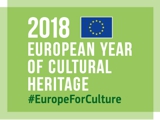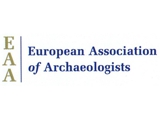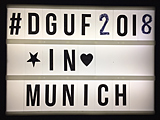More on DGUF.de
Registration and organisational information (German)
"Sharing Heritage - Die Teilhabe am kulturellen Erbe als Bürger- & Menschenrecht". More on the conference in German
This conference on the website of "Sharing Heritage - European Year of Cultural Heritage 2018"
Human Rights Council, Resolution 33/20 (30.9.2016)
"Sharing Heritage - Die Teilhabe am kulturellen Erbe als Bürger- & Menschenrecht". More on the conference in German
More on WWW
This conference on the website of "Sharing Heritage - European Year of Cultural Heritage 2018"
Human Rights Council, Resolution 33/20 (30.9.2016)
International DGUF conference 2018: Sharing Heritage - Sharing cultural heritage as a civil and human right
Munich, 10 - 13 May 2018. Bavarian State Archaeological Collection, Grünwald Castle Museum, and "Forum" in the Freizeitpark Grünwald
The "Framework Convention on the Value of Cultural Heritage for Society" (Faro Convention), which was adopted by the Council of Europe in 2005 but to which Germany has not yet signed up, considers participation in cultural heritage to be a civil right. Karima Bennoune, the lawyer appointed by the United Nations as a Special Rapporteur for cultural rights, goes even further in her reports: where cultural heritage is attacked and destroyed, human beings and fundamental human rights are also under attack. The International Court of Justice in The Hague recently passed the first sentences on perpetrators who destroyed cultural assets for ideological reasons in armed conflicts. In his encyclical letter entitled Laudato Si’, Pope Francis emphasises the protection of culture and cultural heritage and considers it to be a valuable asset compared to economic desires: "The disappearance of a culture can be just as serious as the disappearance of an animal or plant species, or even more serious," he writes. During our conference, we want to discuss what effects a global understanding of cultural assets as part of civil and human rights or as part of creation would have for archaeology and heritage protection in Europe.
The "Framework Convention on the Value of Cultural Heritage for Society" (Faro Convention), which was adopted by the Council of Europe in 2005 but to which Germany has not yet signed up, considers participation in cultural heritage to be a civil right. Karima Bennoune, the lawyer appointed by the United Nations as a Special Rapporteur for cultural rights, goes even further in her reports: where cultural heritage is attacked and destroyed, human beings and fundamental human rights are also under attack. The International Court of Justice in The Hague recently passed the first sentences on perpetrators who destroyed cultural assets for ideological reasons in armed conflicts. In his encyclical letter entitled Laudato Si’, Pope Francis emphasises the protection of culture and cultural heritage and considers it to be a valuable asset compared to economic desires: "The disappearance of a culture can be just as serious as the disappearance of an animal or plant species, or even more serious," he writes. During our conference, we want to discuss what effects a global understanding of cultural assets as part of civil and human rights or as part of creation would have for archaeology and heritage protection in Europe.
In recent years, greater importance has been attached to cultural heritage, and this could significantly change the social and also the legal significance of archaeology and heritage protection yet again if it gains broad acceptance. We want to analyse and debate this as part of our annual conference so as to be prepared in good time for the changes and challenges we will face.
Should what applies in regions of conflict also apply to Europe?
Should what applies in regions of conflict also apply to Europe?

Taking a particular look at the destruction of cultural monuments by terrorists and the illegal trade in antiques, the inclination is to agree to the above-mentioned demands and visions with delight and with conviction. But what if this right to cultural participation really did apply across the board, i. e. for everybody and here in Europe as well? What if different groups with contradicting views stake their claims to cultural heritage, when it is majority opinion versus minorities (worthy of protection)? The Chinese artist Ai Weiwei posed this question some years ago in his own unique way: Can the right to participate possibly also mean the right to destroy cultural assets in order to create culture, e. g. to destroy a valuable vase from the Han dynasty or significantly transform neolithic earthenware vases for new works of art?

We are quick to nod in agreement when the destruction of cultural assets in war zones is declared a violation of human rights (Human Rights Council, Resolution 33/20). But does the human right to cultural heritage and an intact cultural landscape (Convention of Florence, 2000/2004) not apply in equal measure to – for example – citizens in Saxony and Brandenburg as well as the Rhineland, where extensive, largely undocumented destruction of cultural assets and the cultural landscape goes hand in hand with huge open-cast mining operations? How do we deal with the new land utilisation for the “good”, welcome transition to sustainable energies? May we continue to deliberately destroy cultural assets on such a large scale in a balancing of competing interests because it appears to be imperative to sustain our life? What about the rights and responsibilities of citizens (non-archaeologists) – especially when they make different assessments to those which the world of specialists comprising monument preservationists and archaeologists deem to be ethically or scientifically correct?

There is a need to hold a debate to be prepared for the future
In the first European Year of Cultural Heritage 2018 under the special motto "Sharing Heritage", the annual conference of the DGUF wants to make us more aware that there is no broad consensus or complete agreement here, more a need for a struggle about the setting of priorities and legal framework conditions for the protection of cultural assets, and that the idea that everyone has a share in cultural heritage is just as understandable as it is fraught with conflict. A broader reflection, heightened awareness of the problem, a more precise formulation of important questions and initial practical approaches would represent a valuable outcome of this conference.
From the DGUF point of view, "Sharing Heritage" should not just mean the optimum protection of the past, but also that archaeology looks towards a benefit for present and future generations.
In the first European Year of Cultural Heritage 2018 under the special motto "Sharing Heritage", the annual conference of the DGUF wants to make us more aware that there is no broad consensus or complete agreement here, more a need for a struggle about the setting of priorities and legal framework conditions for the protection of cultural assets, and that the idea that everyone has a share in cultural heritage is just as understandable as it is fraught with conflict. A broader reflection, heightened awareness of the problem, a more precise formulation of important questions and initial practical approaches would represent a valuable outcome of this conference.
From the DGUF point of view, "Sharing Heritage" should not just mean the optimum protection of the past, but also that archaeology looks towards a benefit for present and future generations.

Call for papers
... ended 18th of March. The summaries and short biographies will be published in advance, together with the conference program. The talks will be published via the open access DGUF journal "Archäologische Informationen".
... ended 18th of March. The summaries and short biographies will be published in advance, together with the conference program. The talks will be published via the open access DGUF journal "Archäologische Informationen".
